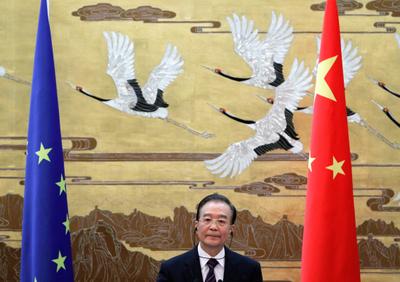A lack of fiscal integration alongside the commitment to a common currency was a serious design flaw in the original European enterprise. The new fiscal disciplines allow more room for the European Central Bank to act as lender of last resort to European borrowers. Whether these ‘architectural’ arrangements for European cooperation will be sufficient to save the euro still depends on how and whether they encourage the ‘substantial’ structural reforms and adjustments necessary to restore growth momentum in the deeply indebted southern European states.
Faced with shrinking economies and rising unemployment, and lacking exchange rate flexibility to restore price competitiveness in external markets, how can the sick economies of Europe get to grow again? Without the option of deeper currency depreciation, real wage cuts and structural reform are the only way to export-oriented growth, targeting non-OECD economies in emerging markets like Asia.
China, of course, is often seen as Europe’s economic deus ex machina. There is the ongoing prospect of growth that China and the other emerging economies offer for European exports. More immediately there is the hope that, with its huge international currency reserves, China can somehow bankroll Europe’s financial black hole.
In this week’s lead essay, Jonas Parello-Plesner reviews the outcome of the recent China-Europe summit and provides an assessment of China’s stake in European recovery.
Parello-Plesner clears the decks with some preliminary myth-busting. Two things ought to be clear, he says. If China takes a larger stake in Europe’s debts, that does not mean that Europe will become deeply beholden to China, economically or politically. And when Chinese leaders say they have confidence that Europe will resolve the crisis and that China will do its part to assist, it does not necessarily mean that Chinese money will flow into European bonds. It is hard to know exactly how much European debt China holds, but the European element in China’s international financial portfolio will be determined on matters of prudential risk, not on matters of sentiment.
That said, Parello-Plesner argues ‘China has a fundamental interest in seeing the euro crisis recede, as it is dependent on the EU for the largest part of its exports. China is also seeking to move beyond dollars in its currency intake, and a world without the euro would be a return to a completely dollar-dominated system’. These are two powerful reasons for China’s positive play in Europe.
The netizens of China are well aware that it makes no sense for Chinese ‘toil and sweat’ to be needlessly expended on European ‘laziness and welfare’. Articulating China’s national interests in supporting European recovery is a delicate exercise for Chinese leaders, who must navigate around national resentments and self-regard.
These hesitations do not rule out additional Chinese financial support. China will most likely put additional money into the EU through an international body such as the IMF in cooperation with other partners like Japan and the BRIC countries. This means China will not have to stand alone with the risk. Yet this strategy too is not without its problems; both the US and paradoxically also Germany fear it could enhance China’s say in the IMF. And so it would and should.
As Parello-Plesner also points out, while China might favour risk-aversion when it comes to buying euro bonds, ‘it is more than willing to accept a stake in Europe’s crisis by buying up companies. Chinese Commerce Minister Chen Deming said he looked forward to a sale of European assets, and China recently purchased a large stake in Portugal’s formerly state-owned energy company, which was sold off because of austerity cuts’.
The rapid move into European corporate acquisitions could well be the most important change in the relationship between the EU and China in recent years — and not only in China’s relations with Europe — and is likely to significantly affect not only China’s role in the world economy but also how the Chinese economy itself is governed, for many more years to come.
Peter Drysdale is Editor of the East Asia Forum.

